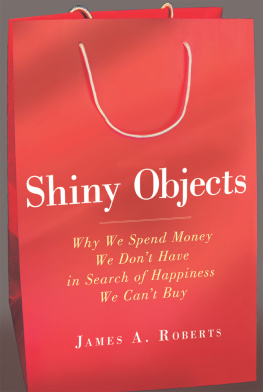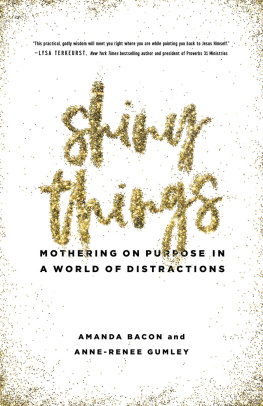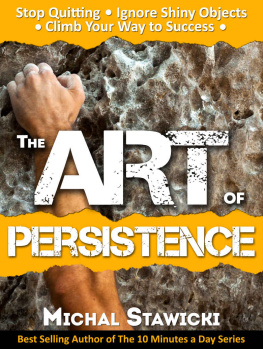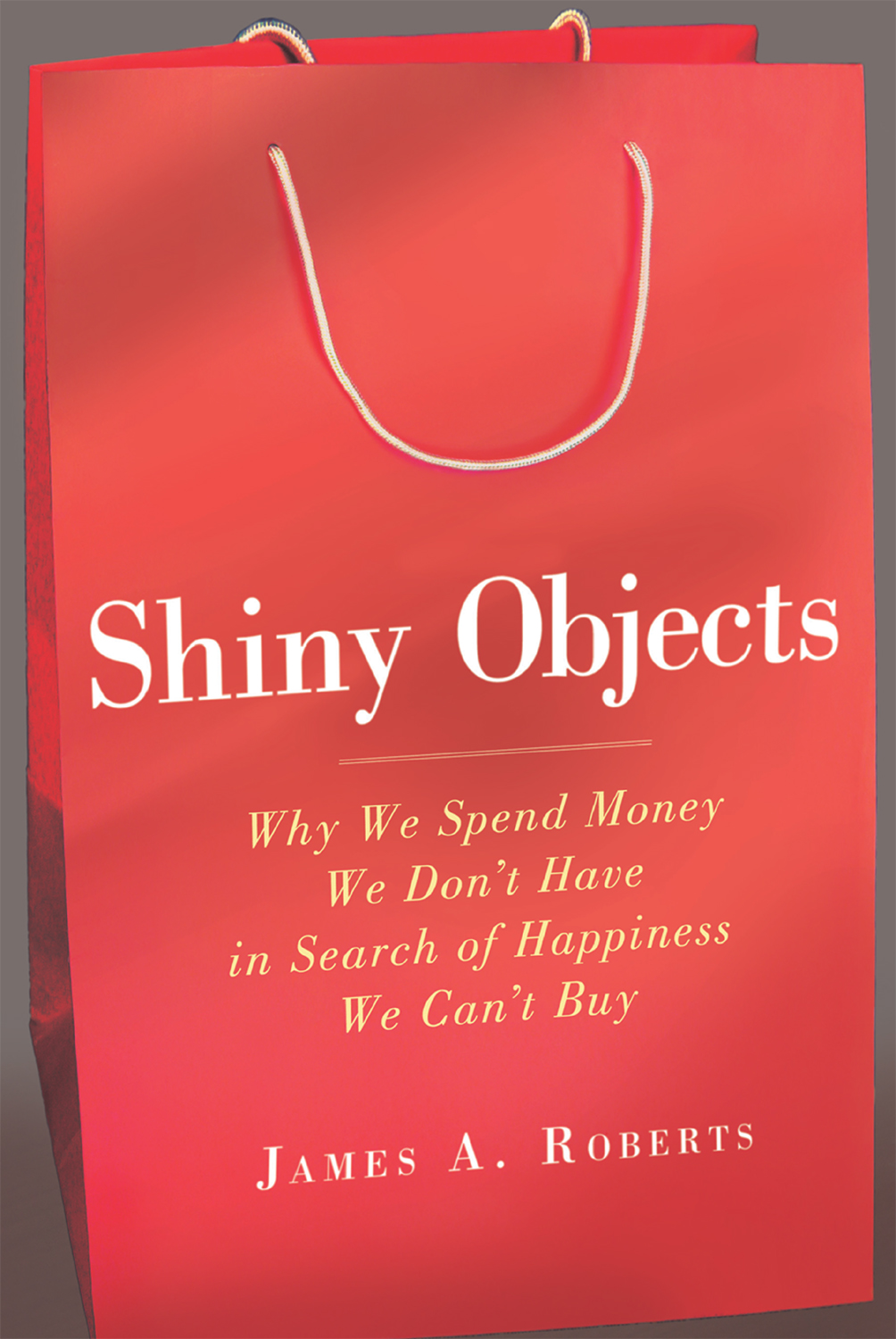JAMES A. ROBERTS
Chapter 1
Shiny Objects
The chief value of money lies in the fact that one lives in a world in which it is overestimated.
H. L. MENCKEN
Shiny object ( ): anything that distracts the easily amused.
): anything that distracts the easily amused.
A dogs life never sounded so good. Forget about sleeping outside42 percent of dogs now sleep with their owners and dine on organically grown meat, vegan snacks, and other gourmet treats. Many even get presents on their birthdays. Americans currently spend $48 billion a year on their pets. Thats double the amount spent ten years ago and is more than the gross domestic product (GDP) of all but sixty-four countries. Spending on our furry friends is expected to top $58 billion in the next few years.
As a loving pet owner, you can splurge $535 on a dog ramp by Puppy Stairs to help your best friend make the ascent to your bed, $30 on an ounce of puppy perfume, and $225 on a trench coat for the family pooch. And lets not forget about doggie slippers, bikinis, and $500 Chanel pearls for those big nights out. What about a $270 Furrari bed for the little guy? Pet owners are also spending big on drugs to fight depression and separation anxiety in pets, as well as on psychological counseling, high-tech medical procedures, various cosmetic procedures, and end-of-life care. Plastic surgeons offer nose jobs, face lifts, breast reductions, braces, and tummy tucks for mans best friend. Nearly $10 billion is spent annually in the United States on veterinary services alone. Americans spend an additional $10 billion on over-the-counter drugs and supplies.
All doubt as to whether pet pampering is out of control ends with Neuticles, a patented testicular implant that fetches nearly one thousand dollars for a set of two. After pets have been neutered, Neuticles allows owners to restore their pets to anatomical preciseness, and preserve both their natural look and their self-esteem according to inventor Gregg A. Miller who has sold more than 240,000 pairs of these little gems. Prosthetic testicles for your canine companiononly in America.
P ET PARAPHERNALIA IS ONLY THE TIP OF THE ICEBERG . W E ARE A NATION IN love with shiny objects. Our homes, our cars, our offices, our purses, and that storage unit we hate to admit to are all overflowing with our precious belongings. Whether your personal weakness is shoes, cars, jewelry, cigars, or any other possession (vintage posters, books, and watches are my downfall), we Americans love our stuff.
When it comes to spending money, are you more of a tightwad or a spendthrift? Youll have a chance to measure for yourself in chapter 5. Given that we are a nation of consumers, you might be surprised to learn that the majority of Americans would be classified as tightwads. With a high percentage of people living from paycheck to paycheck, how can consumerism be so rampant? It all boils down to how we pay for our purchases and the pain of paying associated with each payment method its not that tightwads dont want to spend money, they just dont want to feel like theyre spending money. We are a nation addicted to plastic. Using credit cards greatly reduces the pain associated with paying for our purchasesso much so, in fact, that credit cards have earned the nickname spending facilitators by those of us who do research in this area. When we use credit cards, we make quicker purchase decisions, are more likely to buy, and are willing to pay more.
But can credit cards make us fat? I call this the supersize effect of credit cards. If credit cards can expand your waistline or fatten your thighs, imagine what they can do to your household finances.
As a professor at Baylor University, I have spent over twenty years conducting research with thousands of consumers from all walks of life on the related areas of materialism, credit card use, and compulsive buying. Why, in a land of plenty, do Americans want more? And why is more never enough? Given that most Americans would readily admit that money and material possessions are not going to make us happy, why do we continue to act as if they will? This book is the culmination of my efforts and those of other researchers to answer such questions. And though consumers are inscrutable, we have begun to unlock some of the mysteries behind materialism and its impact on our lives.
As this book details, our obsession with possessions has a significant impact on our well-being. When asked what we really care about and what we consider to be the most life-giving elements of our existence, the vast majority of people respond in terms of the lasting value we place on our relationships with family and friends. And yet our consumer behavior contradicts such professed values. Our real habitsthe time and resources we devote to accumulating more stufftell a different story. As the old saying goes, if you want to know what someone really cares about, look at that persons bank account.
It is my hope that reading this book will give you the time, space, and motivation to examine your day-to-day behavior in a way that our hectic lives rarely allow. Some of the studies and statistics Ill share may surprise you. Some may sound like theyre describing someone else. But they all speak to one undeniable truth: as consumers, were not who we think we are. Its time to bridge the gap between what we say and what we do. Its time to recommit ourselves to the kind of pursuits that are the true source of our well-being: spending time with loved ones, reaching our full potential as human beings, and participating actively in our world. No small task, but one well worth the effort: our happiness lies in the balance.
LIVING IN A MATERIAL WORLD
Our current consumer culture is best understood as an environment in which the majority of consumers avidly desire, pursue, consume, and display goods and services that are valued for non-utilitarian reasons such as status, envy, provocation, and pleasure-seeking. Whether you reside in a major metropolitan city or a rural outpost of North America, you are part of the worldwide consumer culture. To ignore the importance of material possessions in our lives would be equivalent to ignoring that we are born of mothers and fathers.
The emergence of a worldwide consumer culture has potentially severe consequences for everyone. As you will soon see, even if you dont practice or espouse materialistic ideals, you are affected by others pursuit of them. A good example might be the ghost of a recent Christmas past for retailing giant Walmart.
Surely a man the size of Walmart worker Jdimytai Damour could control the expected Black Friday shopping crowds. At six feet five inches and 270 pounds, he was a force to reckon with. In fact, he was chosen to work the front entrance to the Walmart store at the Green Acres Mall in Valley Stream, New York, precisely because of his hulking frame. But, alas, he was no match for the crowd of 2,000 Walmart shoppers eagerly awaiting the 5:00 a.m. store opening. A few minutes before store opening the throng could no longer be held back. The sliding glass doors that separated the would-be shoppers from the myriad of holiday bargains (door busters takes on a whole new meaning) bowed from the bodies pressed against them. Six to ten workers attempted to no avail to push back, but they were fighting a losing battle. In an instant, the glass doors shattered and the frenzied mob surged into the store in search of the heavily discounted doorbusters available in limited quantities for a short period of time. Tragically, Mr. Damour was thrown to the floor and trampled to death (the official cause of death being asphyxiation related to his trampling) in the stampede that streamed over him in pursuit of bargains on big-screen TVs, electronics, clothing, and a myriad of other consumer goodies. One shopper, Kimberly Cribbs of Queens, said that the crowd acted like savages. And the shoppers bad behavior didnt end with the trampling of Mr. Damour. When the shoppers were informed that the store would need to be cleared because of the death of an employee, many continued to shop, yelling that they had been waiting in line since the day before. Many had to be escorted from the store.















 ): anything that distracts the easily amused.
): anything that distracts the easily amused.